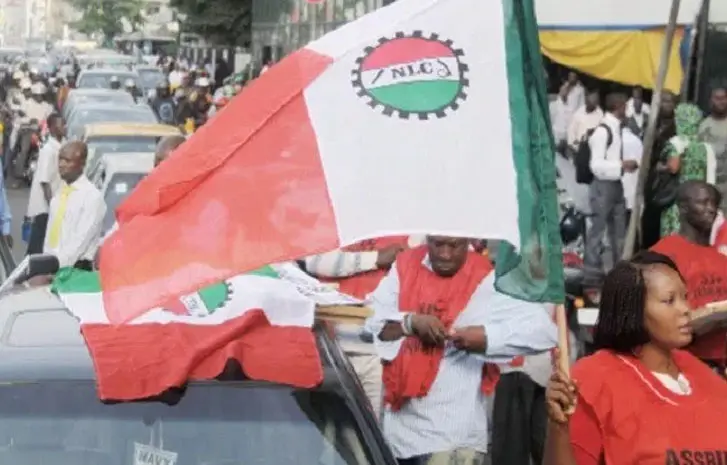“President Goodluck Jonathan’s decision to withdraw the national minimum wage is illegal. Under the labour law it is the federal government that is empowered to fix the national minimum wage. What President Jonathan announced on May 1st was national minimum wage and not federal government minimum wage….The federal government is estopped from abrogating the national minimum wage on the basis of the objections of state governors. If the Revenue Mobilisation and Fiscal Commission can fix the emoluments of the president, governors, legislators, councilors throughout Nigeria, it is sheer hypocrisy to talk of federalism when the federal government decides to prescribe a national minimum wage for workers”- Femi Falana, activist and human rights lawyer.
Nigeria’s political elite pressed the panic mode this week; and when it matters, they know how to rally their forces. The basis of panic is the threat by the NLC to commence a three day warning strike, because of delay in implementation of a much advertised national minimum wage. When the habitually incompetent Goodluck Jonathan announced the N18, 000 minimum wage, on May 1st, he was obviously playing politics rather than a genuine effort to ameliorate the conditions of the working people in a season of deprivations arising from the world-wide crisis of the capitalist system and the peculiar pattern of mismanagement central to Nigeria’s neo-colonial capitalism. There has been systematic erosion in the income of working people over the years in Nigeria, an ironic situation, given the incremental earnings from oil, since 1999.
There is a deeply entrenched inequity, in terms of accruals to different segments of Nigerian society. The working people and the poor are the damned of the income divide, and Nigeria has one of the most pitiless and inequitable class divisions in the world. Our rulers incrementally removed the social net from the poor, and have fostered a socially uncompassionate society. As Ngugi wa Thiog’o said of the African bourgeoisie, in his book, DEVIL ON THE CROSS, if the Nigerian ruling class can bottle the air we breathe and own it exclusively, they would have done it without hesitation. So the strike threat jolted them, not because they care about the economic consequence, but the political effect a strike can have on calculations for 2011 elections.
A strike will explode the yarns about Goodluck Jonathan’s alleged “divine” choice that Dr. Dalhatu Tafida has turned into a sickening mantra. A strike will reveal a typical neo-colonial ruler, who does not keep promises. And who can deny that Goodluck Jonathan’s main political baggage is the fact that he is not honorable and does not keep agreements, as the zoning controversy in the PDP has shown? A man who flouts agreements within his party cannot be trusted to keep a promise about minimum wage. That is why a strike is the weapon to knock sense into their heads! They realize its import, hence the panic that took over political society.
In truth, the working people have several reasons for strikes. Take the peasantry; they contribute 40% of the GDP and yet get little in terms of support from the state for extension services, improved seedlings or such general improvements that can take the peasantry into modernity. The annual importation of fertilizers is a political scam and a monumental fraud. The situation of the urban working people is only marginally better. Meanwhile, according to DAILY SUN of Monday, November 8th, between January and June 2010 alone, the 36 states shared N1 trillion, most of which went into projects to facilitate the stealing needed to rig elections. Many states did not properly implement the old minimum wage, so the new one is an unwelcome intrusion!
The inequity of income is best illustrated by the emoluments of members of the National Assembly. Last week, Professor Itse Sagay, at a lecture in Lagos, revealed that a Nigerian Senator in 2009 earned N240million in salaries and allowances, while his House of Representatives counterpart earned N203.8m. In other words, a senator earned about $1.7m and a Rep, $1.45m per annum, earning more than US President Obama, who earns $400,000 per annum and British Prime Minister earning 190,000 pounds. By contrast an American Senator earns $174, 000 and a UK parliamentarian about $64,000 per annum; adding that “Nigerian legislators…awarded themselves the highest salaries and allowances in the world”. Furthermore in 2009, Federal legislators received a total of N102.8billion comprising N11.8billion as salaries and N90.96billion as allowances. So 5% of Nigeria’s annual budget is spent on 109 senators and 360 Reps. The Senate President, is reported to be earning N250m quarterly or N83.33m monthly, while his deputy earns N50m per month. Senate allocated N1.02billion to its 10 principal officers as quarterly allowance, at N78m every three months or N26m per month.
These legislators are simply consumers of national resources, just as much as their counterparts in the Executive, with a retinue of ministers, advisers, special assistants and personal assistants. Yet they dither about a minimum wage for working people, until faced with the threat of a strike. Nigeria’s inequitable society is not sustainable. We grapple with low intensity warfare in several places as our uncompassionate society, leaves many citizens on the margins of existence. Over 44 million young people are unemployed, many without requisite skills for modern jobs. The economy is not creating new jobs to absorb them while over 60% of the urban population lives in dire straits and the hopelessness foster anti-state criminality and loss of belief in Nigeria. Anarchy is rife, as kidnap gangs roam urban and rural areas all over. These give an indication of the depth of crisis and failure of the ruling class project. A strike is no solution but a symptom of national malaise; but the working people must speak out forcefully for all the poor!


